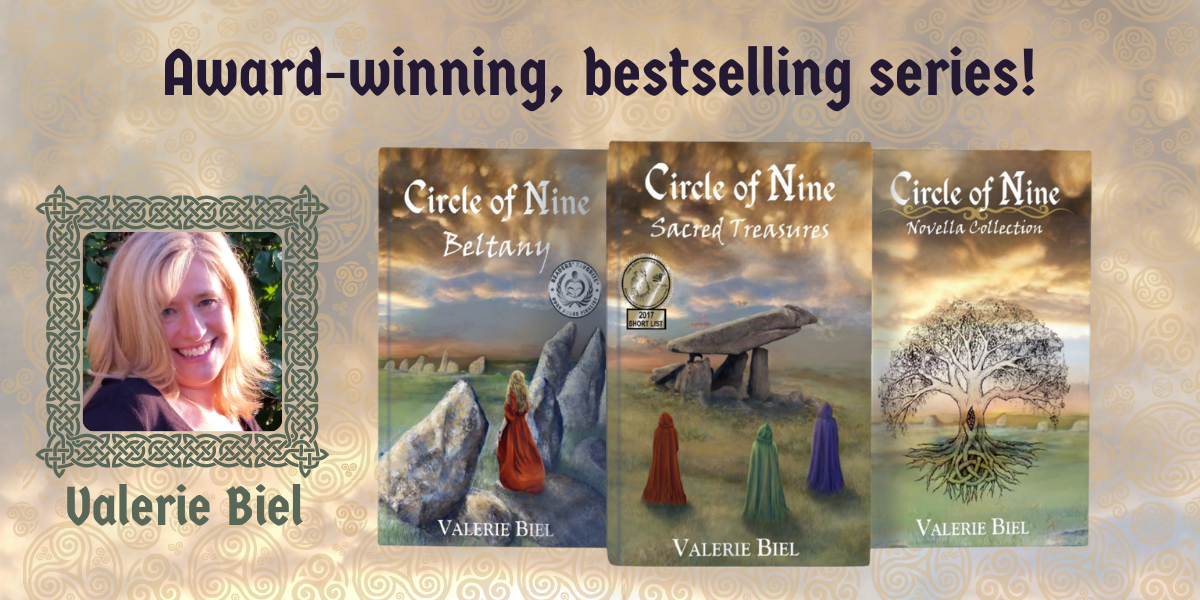You’ve achieved what many authors hope for with your dedicated readership and award-winning books. What inspired you to begin this journey of the written word versus any other means of communication?
I’ve always been a storyteller and often that takes the form of oral storytelling in an informal way . . . and as I’m both the youngest child in my family and a Leo, conveying a story out loud fits my personality. But I also love to write and while others tell stories with their music or their art, my strengths are with the written language.
How long have you been an author? Has being an author changed you as a person? In what ways?
That’s an interesting question . . . I’ve been a ‘writer’ since I was very young. I feel authorship starts when you share your content widely with others. (But feel free to disagree with me!) So, I’d say I’ve been a fiction author since about 2010. I am a happier person when I get to be creative through my writing, and I don’t think before my books were out in the world that I truly understood the satisfaction that I would feel when a reader says they enjoyed my stories. I would say that’s given me more confidence in my writing and satisfaction for sure.
When you bring a character to life, how do you develop his or her personality? It’s often said that most characters are taken from the writer’s own life, but also that they take on lives of their own. Have you ever had characters in your books have conversations in your dreams? If so, do you keep a pen and paper by the bed, wake up, and immediately note what they are saying?
Creating characters that are both interesting and relatable to the reader is a challenge I love. I typically have the main character for a work of fiction in my head for a while before I start writing. Getting that internal ‘voice’ right can be tricky, but I tend to think through all their characteristics and back story even if some of that information is never conveyed to the reader. It helps to really know your characters to write their experience – albeit fictional. And, yes, I draw from my real life experiences/interactions to create characters, but most of the time my characters are a composite of so many things that I don’t think anyone would find someone recognizable in my stories. (At least – I hope not!) And, yes, characters do take on a life of their own at times – which is great – and often leads me to those ‘ah-ha’ moments when my imagination creates a special gem to include in the story. I do not dream about my stories very often . . . but you might find me having conversations with my characters as I work out what they’d do next if I’m at a roadblock. (I think people in other cars assume I’m on Bluetooth when they see me talking at stoplights – LOL – little do they know what I’m really doing!)
How do you balance the imaginative world you build with grounding in reality?
My Circle of Nine series has magical or fantastical elements but set with in a real world that we can recognize. Other books are contemporary and while they’re fiction, they describe potential real-world situations. I like that fiction gives me the opportunity to control the outcome of stories. Often when I’m deep in writing, I will not overly immerse myself in real world things—like watching the news, so I can in my fictional creative zone better.
What are the most challenging parts of creating, editing and publishing?
Marketing my work is definitely the most difficult thing . . . and finding time for my own writing as I also provide author services to help others publish and market their own books.
How and why did you choose YA as a major genre for your books?
I gravitate to the Young Adult genre for a few reasons. I remember distinctly what it felt like to be a teen. I love to read YA/teen novels still and so do many other adults. I find that this age character is so enjoyable because they have so many possibilities in front of them as they enter adulthood. I also write middle grade novels, too. And I’m certainly not saying I wouldn’t write books with predominately adult characters in the future. In fact, there are adult character stories in parts of my Circle of Nine series already. So, I really like creating characters of any age.
What messages or lessons do you want your readers to begin to understand?
I think a predominant message in most of my writing is to trust your instincts or listen to your intuition. We are often steered away from this type of intuitive thinking and told to be logical and weigh the pros/cons etc.. for decisions making, but I think that’s a disservice to our inner voice that can guide us very well if we let it.
How do you research the historical or cultural aspects of your works?
I love in-person research where possible, hence my many, many trips to Ireland for my Celtic-mythology themed series. But you can do a lot with google to find the proper information. We’re lucky to be living in an age where we so much information is available at our fingertips. For instance, in one scene I needed to know how much a pot of jam might have cost in the mid 1300s in Ireland. Well, lucky me, someone had taken the time to enter the costs of foodstuffs into an internet archive that allowed me include the proper reference in my story.
How do you deal with creative slumps?
Most of my issue with slumps come from not making enough time for my writing, and that’s just a scheduling issue. I need to put my writing time on my calendar and then honor that commitment. But for a true writing slump, I typically allow myself to do what I call ‘garbage writing.’ If I’m at an impasse in the story, I just free flow what might happen next with very messy writing – sometimes little punctuations and no dialogue tags etc… and I just get some options down on paper. More often than not, something comes of that and gets me moving in the right direction. Other times, I find that doing some unrelated writing (not on my current work in progress), like a blog post or an article or an essay, can get me moving again and ready to tackle the fiction work. But I advise that if you ARE in a slump and you’re not sure what to right next in your fiction project, ask yourself this . . . is it because you know that you’ve got to make a major change with the direction in which you’re going? Often, we stop writing when we reach a point where we know (deep down) that we have to backtrack and take a different approach on a project. And no one loves doing that! So we sometimes get a little paralyzed knowing that our next steps are going to be a lot of work.
How do you handle feedback and criticism from readers or reviewers?
Best advice – do NOT read the reviews. LOL Well, actually, go ahead and read them – but NEVER, ever respond to the negative ones. People are going to love what you’ve written and people are going to hate what you’ve written. And some people are just big jerks, so ignore them and carry on. I will say that there is one review of my first book on Amazon where someone took issue with the height of the standing stones on my cover. And, yes, most of the stone circles in Ireland are relatively short . . . however . . . the Beltany Stone Circle (where my story is set) has stones that are nearly 3 meters tall. I really wanted to write back to that person, but I judiciously backed away from the keyboard.
If you could co-author a new book with someone who is no longer alive, who would you choose and what would you name the book?
Ha – good question. Wouldn’t it be fun to write with Jane Austen, Charlotte Bronte, or Louisa May Alcott? I have no idea on a name, but it’d be fun to modernize one of their books and give their characters a modern-day woman’s viewpoint.
Finally, writing and publishing your intimate thoughts and feelings in some ways makes you vulnerable, baring your inner self to the public. At the same time, sharing those stories is a work of inestimable generosity. How do you see your role as an author in the large picture of your life? What is your core purpose in writing?
Well, I write fiction, so you’re really NOT getting my intimate thoughts and feelings to a large extent most of the time. However, I know what you mean, in that it’s inevitable that you channel your own belief structure into your characters. I really just hope that readers take something positive away from reading my work . . . and that can be as simple as reading my stories for pure entertainment. I don’t write highly thematic, literary fiction, so I don’t expect any sort of existential debate to occur about my work. I do ask myself this . . . “Would I continue to write even if no one read my work?” And, while I’d be sad, the answer is, yes—that I’d continue to write my stories because it’s an essential part of who I am.
About The Book:
Circle of Nine: Beltany
◆ Kindle Book Award Finalist ◆ Readers’ Favorite Book Award Finalist ◆ Gotham Writers’ YA Novel Discovery Contest Finalist ◆ B.R.A.G. Medallion Honoree
“Since I was a little girl I’ve been labeled a freak in my small town. There’s no blending in when your mom practices an ancient pagan religion and everyone believes she’s a witch. On my 15th birthday my secret wish is the same as always – to just be normal. But that’s not what I get. Not even
close.” – Brigit Quinn
Instead, Brigit is shocked to learn she’s descended from a legendary Celtic tribe — powerful people who serve as guardians of the stone circles of Ireland. A spellbound book of family history reveals the magical powers of her ancestors. Powers that could be hers — if only she wanted them.
And when someone sinister and evil returns to steal her family’s strength, Brigit has to make a decision. Fight to keep her unique heritage or reject it for the normal life she’s always wanted.
This contemporary coming-of-age novel will appeal to readers who enjoy stories of magic steeped in the mysticism surrounding the standing stone circles of Ireland.



